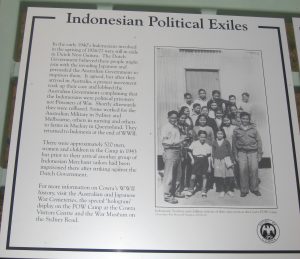The uncompromising Dutch re-colonialisation attitude only fuelled a broader pro-independence attitude among the ‘Indonesians’ in Australia. Those who wanted to leave the Dutch service, were treated as deserters and were given harsh punishments by the Dutch authorities, and jailed in Long Bay, Loveday (South Australia), Cowra (central NSW) and Liverpool (Sydney). The NEI government-in-exile had their own police and military force in Australia, who had near full autonomy in relation to their ‘subjects’, they could wear and use weapons.

The first prisoners arrived in 1942, 800 striking merchant seamen from Dutch ships. When the Dutch East Indies fell to Japan, the men demanded equal pay with Dutch and Australian counterparts to transport war armaments. They were knocked back, and shunted off to Cowra for their impudence. Because they could not be held there indefinitely, a deal was struck – return to the Dutch ships or be conscripted to military labour camps.
The most significant group of Indonesian internees to pass through Cowra were political prisoners from Tanah Merah, shipped from Dutch New Guinea as the Japanese marched south in 1943. Dutch authorities convinced Australia the men and their families, whom they described as communists, may assist the Japanese if left behind.
The Dutch tried to portray the political internees as dangerous and uneducated but their Red Cross submissions for intervention indicated that what the Dutch really wanted was to keep the nationalists away from the seamen.
The Dutch were only prepared to provide more participation of ‘Indonesians’ in local government structures but still have to be under the final control of the Netherlands, they had no interest in discussing independence and were adamant to restore colonialism. As a result, animosity against the Dutch increased. In Australia, the Digulists were able to put their political case before the trade unions.
What must have played a role in the back of the minds of the Dutch politicians was that a significant part of Dutch wealth depended on the income from the NEI colony and when after WWII the Netherlands itself was close to bankrupt (the US Marshal Aid prevented this from happening) they were desperate to restore the situation where they again could reap the financial benefits from their colony. At the same time many Dutch companies had a vested interest in seeing colonialisation being restored.
But of course, the war had changed the world, people in this part of the world wanted to get rid of the their British, French and Dutch overlords.
The USA and Australia already before the war supporter an anti-colonisation policy. Throughout the war that created tensions but the war effort to defeat did put a lid on that. This totally changed after the war. The American President Franklin Roosevelt suddenly died , he had a special relationship with the Netherlands as his family was from Dutch decent. His successor Harry Truman did not have such emotional ties and was in favour of letting the Indonesian make their own decisions about their future. The Netherlands became more and more internationally isolated.